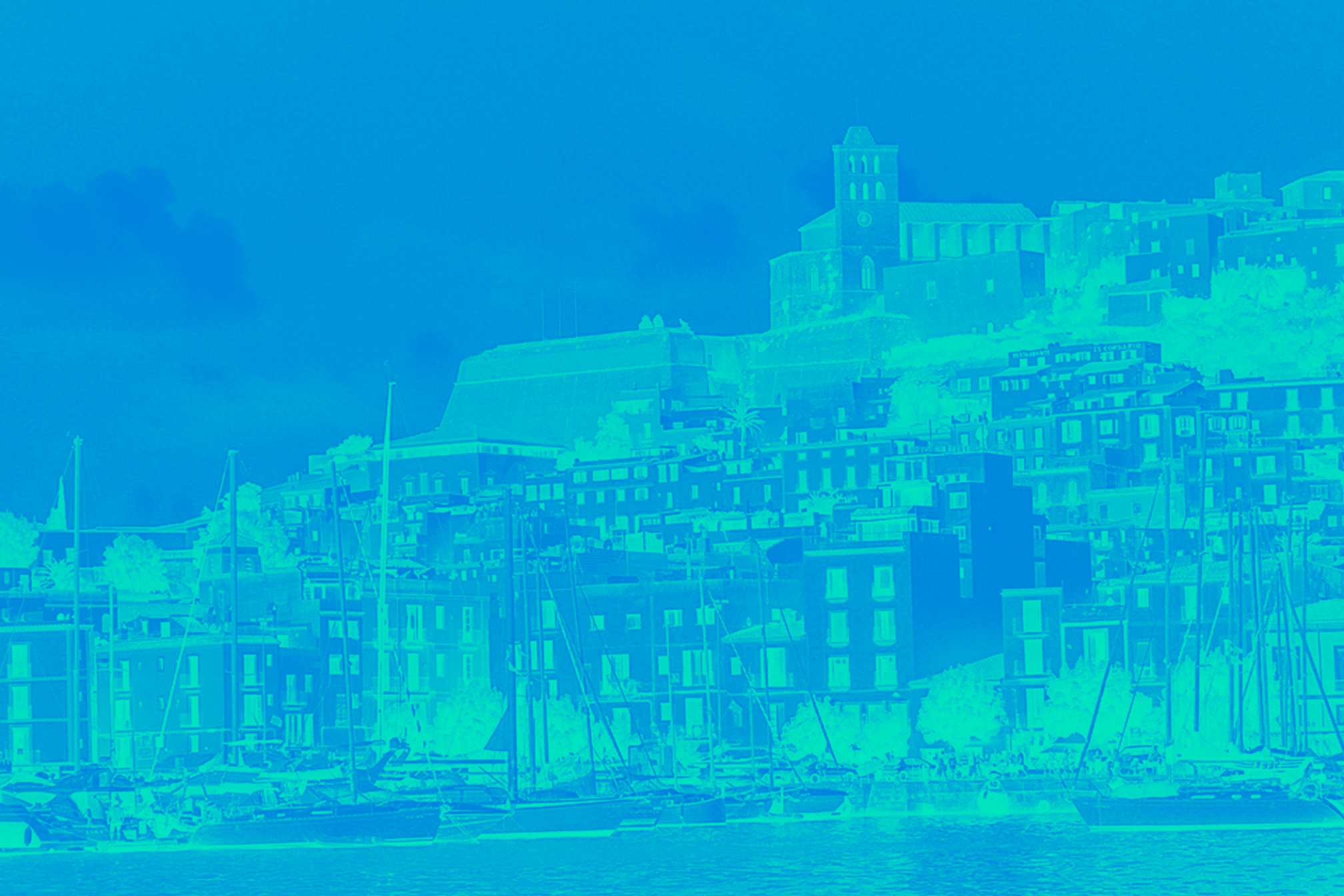 Features
Features
Can Ibiza survive by building a sustainable future?
As the dust settles on Ibiza's longest ever season, the impact of the pandemic and break from clubbing has sparked an identity crisis on the White Isle, raising questions about the economic reliance and environmental impact of party tourism
Ibiza is one of the world's best clubbing destinations: bringing in 2000 tourists to the Balearic Island per 100 residents since 2017 – making it the second-highest tourists to resident ratio in the world. However, when the party was put on pause in 2020 – fuelled by the closure of clubs and flight cancellations – its reliance on tourism was brought to light.
“It was alarming how many people had to approach foodbanks here – so much so they were running out of supplies. It was a very testing time for people,” Kellie Allen, a DJ and music producer who co-owns The Hub, a coworking space in the centre of Ibiza, recalled. “The pandemic affected much of the world, but because we rely so heavily on tourism, not having those two seasons was particularly brutal for the economy here.”
Fortunately, the devastating economic impact of the pandemic on the island was short-lived. As of 2022, the party is well and truly back on its feet: clubs are open once again, and tourism levels are back to roughly what they were pre-pandemic – even Skepta played a DJ set in DC-10. And yet, despite this, COVID-19 has left a scar on this island.
Although the lack of tourism had a catastrophic effect on jobs and livelihoods, it had a positive influence on biodiversity and the environment. Now Ibiza is facing something of an identity crisis. The question has been raised: is this model of tourism actually sustainable? And if not, how does Ibiza move forward while keeping its title as the world's greatest clubbing destination?
Read this next: Ibiza past: bringing the golden era of the White Isle to the present
“We recognise that tourism is the main economic engine of this island, which includes people who come here for club nights and the music, but it’s also much broader than that,” says Kate Benyon-Tinker from IbizaPreservation, a non-profit environmental organisation. "This is an issue with the tourism sector as a whole.
“Ibiza is a small island that has limited resources. In order for tourism to be sustainable over the long term, it’s essential that both companies operating in this sector and the tourists that come to visit us practice a more sustainable and responsible form of tourism,” she continues.
According to IbizaPreservation's Sustainability Observatory report, which monitored the greenhouse gasses of the island, harmful CO2 emissions dropped by up to 98 per cent between March 15, 2020, when lockdown on the island began, and May 10, 2021, when the strictest measures were lifted. This was largely due to the massive reduction in air traffic, as well as cruise ships and other maritime traffic. Nitrous oxide levels also roughly halved due to significantly less traffic on the road.
Unsustainable tourism is also having an impact on the island’s water quality too. IbizaPreservation's Sustainability Observatory has also released a report stating that between 2010 and 2021, the percentage of bathing areas - waters where large numbers of people are expected to bathe or swim - rated as “excellent” halved, from 100 per cent to 50 per cent.
“Bathing waters are a key part of our natural environment and are exposed to both man-made and natural sources of pollution,” Itziar Arratibel, the technical coordinator of the Observatory, said in the report. “In this case, it seems reasonable to surmise that human pressure together with issues around local infrastructure could be behind this increasing deterioration in water quality.”
“It’s devastating for the people who live here all year round – they see this influx of tourism and the trash, the pollution and the toxic waste that comes with it,” says Jo Youle, a journalist and creator of The Reset Rebel podcast. “We all want to party, but ultimately it’s not sustainable to have cheap packaged holidays where people leave a lot of destruction in their wake.”

Over the years, residents on the island have become more vocal about the impact excessive tourism is having on their island. This current model isn't just having a detrimental effect on biodiversity – it’s impacting local communities too. Noise pollution is something that has “generated a lot of friction between residents and nightclubs and hotels,” says Gianandrea Di Terlizzi, from the Ibiza political party Podemos. “People living within kilometres of these establishments cannot stay inside with open windows because they’re invaded by the noise.”
In July, the iconic DC-10 venue was forced to shut its garden stage due to noise restrictions put in place by local authorities. This was part of a series of crackdowns which is happening across the island, according to the local newspaper Periódico de Ibiza y Formentera. As of July, the police of Saint Josep conducted 22 shutdowns of music equipment in 2022 – as well as reviewed 42 premises in the municipality, issuing fines ranging from 600 to 300,000 Euros.
The rise in tension between locals and tourists has led to the formation of pressure groups, such as PROU!, who protest against the detrimental impact excessive tourism is having on their community. Nick Ferguson, who oversees the operations of Defected Records on the island, suggests their voices may have been heard. “The Spanish Government has tried to change the perception of Spanish holiday resorts – especially the Balearics. It was really harmed by excessive partying, excessive tourism and excessive commercial tourism,” he says.
Read this next: Skepta on DJing in Ibiza: "I felt Virgil's energy in the booth"
Measures to restrict anti-social behaviour have been implemented this summer – including alcohol restrictions and limits on all-inclusive holiday hotels to six drinks a day, as well as a crackdown on ‘party boats’. “You’re not allowed to organise ‘party boats’ anymore, or at least call them that,” he continues.
Kellie Allen holds a similar view: “I think it’s easy for people on the outside to say ‘well what do you expect, you live in Ibiza’ but I do have a level of sympathy for people who live close to clubs. After years of not having that noise, to come back as a bang probably is a trigger to many people.”
However, it’s “reasonable” for music to be allowed to play in an outdoor venue up until a certain point at night, she argues. Noting that “having to play outside at 75 decibels can be frustrating for the DJs and promoters too. Everyone is trying to do their best. I’m curious whether it's a result of people not having two years of noise, where people got used to that and expected to have that again – it’s a tough one.”
It’s a complex web to untangle; finding the balance between economic prosperity, while protecting local communities and culture, has proved to be challenging. Terlizzi believes that limiting the sheer number of tourists to the island could be an effective solution. “In 2021 we had a season that was half-gas, certainly much smaller than previous years before the pandemic – between 40 and 50 per cent the capacity – but yet the economy overall was good,” he remarks.
This would also help put an end to the skyrocketing property prices in the area, fuelled by unlicensed and private Airbnb rentals. Between 2006 to 2021, the average cadastral value of the real estate for residential use has doubled, pricing natives out of affordable housing.
Rental prices have also shot up in recent years, with costs in season doubling between 2011 and 2019. According to data from IbizaPreservation, residents on the island now spend an average of 82 per cent of their income on housing. However, limiting the number of visitors would also mean venues and nightclubs would take the brunt of the blow.

Alternatively, Allen suggests that the island can keep its iconic club-goer reputation while also embracing newer, emerging reasons why people visit Ibiza. “I think the problem is that some people miss that the tourism we have on this island, which is very seasonal, can also be met with this alternative tourism which has started to peak since the pandemic,” she suggests.
The number of people who work remotely has steadily increased over the last decade – the pandemic acted as fuel to the flame, with one study suggesting as much as 16 percent of all companies globally are now fully remote. Many, like Allen, suggest that this new influx of remote workers could provide a much-needed balance in tourism – a demographic which is less party-focused and more involved with the local community. “There are a lot of remote workers now – people can live anywhere in the world – and these two models can work harmoniously together,” she continues.
“I think the problem is that some people miss that the tourism we have on this island, which is very seasonal, can also be met with this alternative tourism which has started to peak since the pandemic. There are a lot of remote workers now, people can live anywhere in the world and these two models can work harmoniously together.”
Regardless, it’s clear the island's current tourism model is unsustainable – causing social, economic and environmental challenges – and that change is needed. But how? Benyon-Tinker argues that a “two-pronged” approach could be the answer – a form of tourism that doesn’t “put local resources, as well as the natural and cultural heritage of the island at risk.”
Read this next: “The planet is our only dancefloor”: how dance music events are adapting to sustainability
Companies should take into consideration the environmental impacts of their operation, Benyon-Tinker adds, for instance limiting the use of single-use plastics. “Every 3000-person capacity nightclub can generate up to 400,000 bottles per year – if you multiply that by all the clubs on the island you’re talking about millions of bottles per year being produced,” she said.
Benyon-Tinker admits that flying is the most practical option for getting to Ibiza, but highlights that there are ways to reduce the carbon emissions tourism causes – for instance ensuring the hotels and accommodation use green energy and are environmentally friendly. “You can also use public transport or electric cars for getting around the Island,” she adds.
“We also suffer from water shortages, so make sure you save water by taking shorter showers and turning off taps – simple things like reusing reusable water bottles. There are simple steps that people can take, you may not have a 100 per cent environmentally friendly holiday but you can reduce their impact.”
Overall, however, solving this problem requires collective responsibility – from politicians, venues, clubs and, most importantly, tourists themselves. Many believe the lens should be shifted toward the attitudes of people who visit the island, such as Alex Kennon who has been a DJ on the island since 2011. “Some of the people that come here don’t respect the island – this is something that should be controlled.”
“Ibiza is known for its nightlife. If it weren’t for the clubs, the parties and the movements on this island, we wouldn't be at this point,” he continues. “This is truly the best place to live in the world, where you can have a summer party but also be respectful of the island. Some people like to think that Ibiza gives you the ability to be anonymous, a place where you can live freely. It’s real freedom, sure, but not freedom that allows you to act like a dickhead.”
Jack Ramage is a freelance journalist, follow him on Twitter


